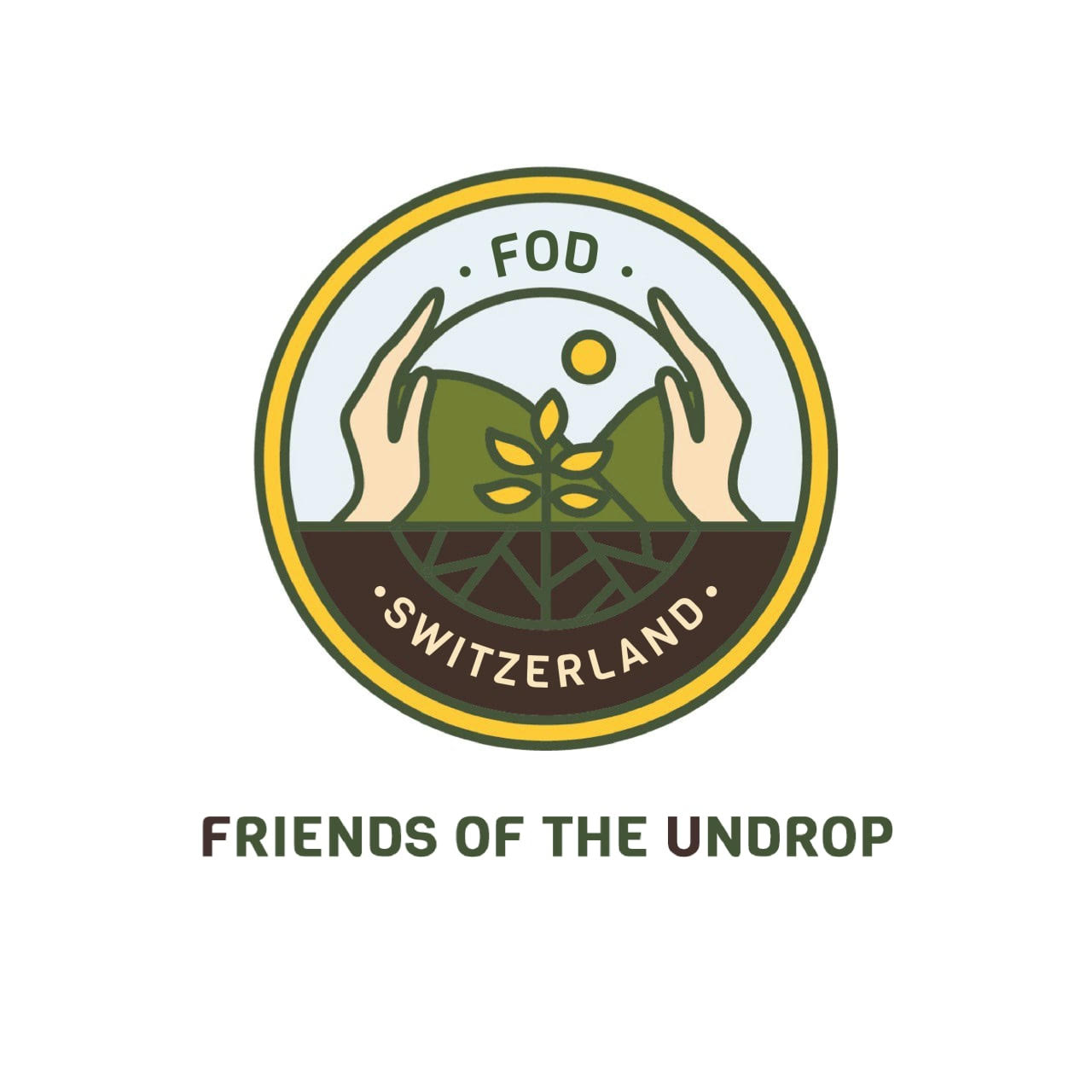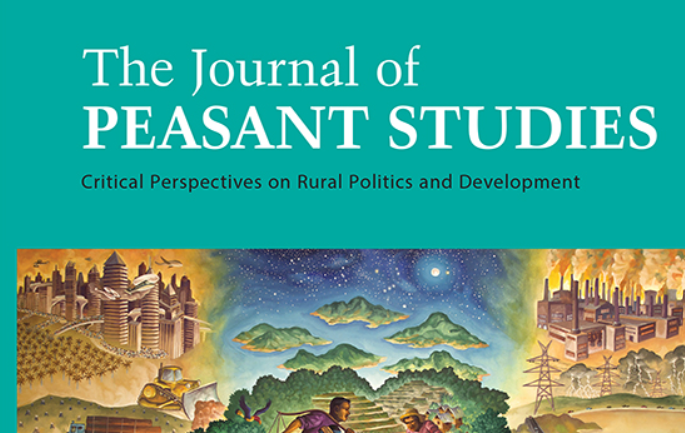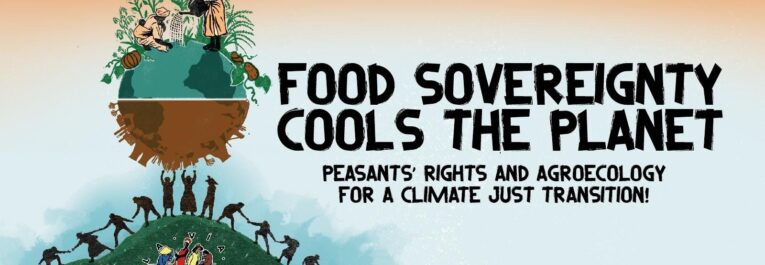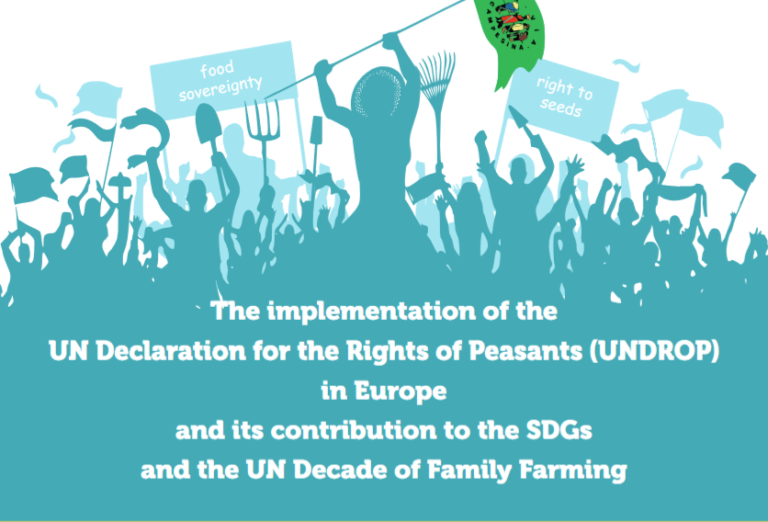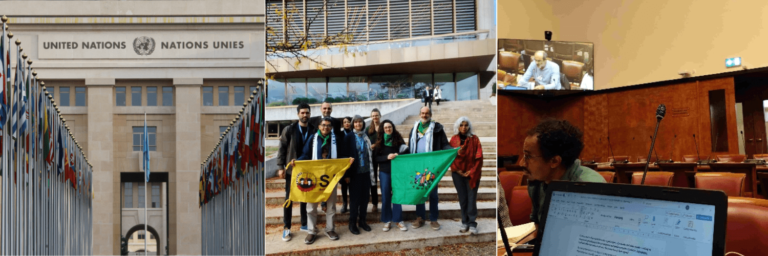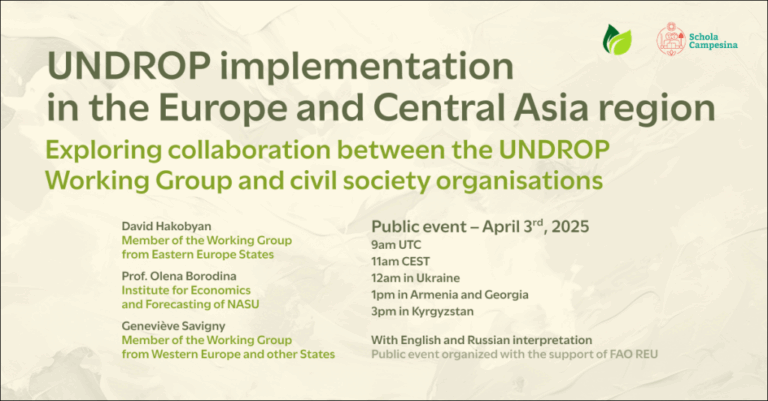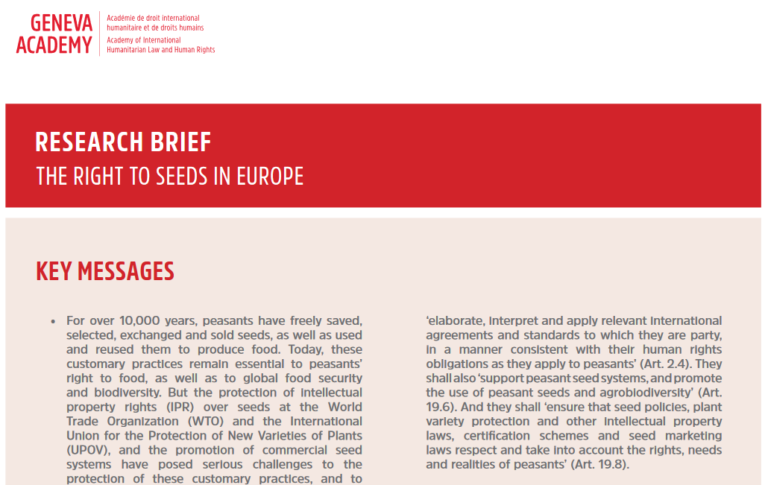The UNDROP and its implementation in the context of Switzerland: an overview of political networks and challenges
In this article, Danilo Borghi Gonçalves Pinto analyses the perspectives and challenges of the Swiss coalition “Friends of the Declaration” in the promotion and implementation of the UNDROP in Switzerland. It identifies that although the coalition has mobilised the UNDROP on national and international spheres, the level of political articulation is greater in the latter in comparison to the former. Although changing Swiss foreign policies in the light of the UNDROP is a significant political challenge, mobilising the declaration within the Swiss peasantry remains the main challenge of the Swiss coalition so far.
Originally written in 2021.
Introduction
The UN Declaration on the Rights of Peasants and Other People Working in Rural Areas (UNDROP) was adopted by the General Assembly of the United Nations in December 2018, after a nearly 20-year elaboration and negotiation period that involved UN member states – led by Bolivia – and the transnational peasant movement La Via Campesina, which was since the outset the main idealizer and promoter of what has now become the UNDROP. Switzerland played an important role in such process (Dommen and Golay, 2020), being responsible to organise some important international events to promote the declaration both before and after its adoption.
The sociopolitical coalition Friends of the Declaration, created after the adoption of the UNDROP, is the group now pushing for the implementation of the peasant declaration in Switzerland. In this sense, this paper focuses on the current efforts and challenges faced by this coalition around the promotion and implementation of the UNDROP in the country. It provides an analytical overview of the actions conducted and views shared by the coalition’s members, which is formed by a Swiss peasant union, NGOs, and an academic institution. Together they join forces towards “bringing the declaration to life” in Switzerland.
The paper is divided into three sections. The first introduces the Friends of the Declaration coalition, while the second elaborates on their fronts of action and the third on their views and challenges towards implementing the UNDROP in the country.
The Friends of the Declaration – A Swiss coalition for pushing the UNDROP agenda
When it comes to the Declaration on the rights of peasants in Switzerland, the group – strategically named – the Friends of the Declaration1 (henceforth FoD) takes up a central place on the political stage. They are a sociopolitical coalition composed of different organisations that act for the promotion and implementation of the UNDROP within the country.
Officially created under this name in early 2019, the coalition gathers a group of Swiss-based organisations that had previously worked together during the declaration’s negotiation process to push for its adoption within the UN system and to assure Switzerland’s positive stance towards it (efforts which did result in a double success). The nine organisations currently forming the coalition are diverse in scope and areas of action: CETIM and FIAN Switzerland (human rights NGOs); HEKS/EPER, Pain pour le prochain2 and Action de Carême (Christian development NGOs); Swiss Aid (development NGO), Alliance Sud (alliance of Swiss development NGOs), the Geneva Academy (academic/research institution) and Uniterre (peasant association/union).
The UNDROP’s adoption was a fundamental step for the consolidation of this political coalition, whose idea to create it first came about at the HEKS LandForum annual meeting held in December 2018 – which included the above-mentioned organisations3. Its very creation under such name acts as an important showcase for the declaration – both at the national and international levels – and expresses the central goal of the group: “to bring the declaration to life”.
In the context of an increasing neoliberalisation and transnationalisation of agriculture in the past decades, agrarian issues of access to land and food production became increasingly shaped by a politics of human rights and environmentalism of global amplitude (Kearney, 1998). In this sense, agrarian movements have joined forces with human rights NGOs and academic experts to push their political struggles at an international human rights level. This alliance that congregates local and transnational grassroots knowledge (through peasant movements) with the legal knowledge necessary to access international human rights frameworks (NGOs and academic experts) forms what Keck and Sikkink (1998) called “transnational advocacy networks”. It is precisely within this new configuration of agrarian struggles that the FoD coalition comes into existence.
Setting the scene: an overview of the actors and their fronts of action
The plurality of actors composing the FoD results in a range of actions taken by the coalition for promoting the UNDROP in Switzerland. In general, these actions can be divided into two fronts that focus on international and national affairs.
These fronts take shape in accordance with the specialisation area of each member of the coalition. For instance, although both fronts push for the promotion and implementation of the UNDROP in Switzerland, the first concentrates its efforts on the different impacts the country’s foreign policies have on peasants’ rights worldwide, as well as in pushing for Switzerland’s engagement in promoting the UNDROP within the UN System and through Swiss-funded development projects carried out abroad. The second front, on the other hand, focuses instead on issues concerning the national agricultural system and political struggles of the Swiss peasantry. Although overlapping in some areas4, these fronts of action distinctively mark a division within the Friends of the Declaration.
The international front
The actions undertaken with an international orientation are shared, to greater or lesser extent, among all members. Their foci, however, differ depending on the type of work developed by each organisation.
CETIM, for instance, as a Human Rights NGO with consultative status at the UN (ECOSOC NGO Committee), worked closely with LVC during the long years of the UNDROP negotiation process and served as an entry point for LVC members to participate in the human rights debates held at the UN in Geneva (see Hubert, 2021). Today, CETIM’s main activities remain centred at following and promoting peasants’ rights discussions in the UN, while its team also elaborates and publishes research papers and informative documents on the declaration – such as the multiple “training sheets on peasants’ rights”.
The four Swiss development agencies (HEKS/EPER, Action de Carême, Swiss Aid and Alliance Sud) push forward the UNDROP agenda in their diverse rural development projects implemented in economically less privileged countries. For instance, these organisations carry out diverse projects on agroecology, food security, food justice, seeds, and rural development across Latin America, Africa, and Asia – the main target regions of the development narrative.
Moreover, the Geneva Academy publishes a series of studies conducted on the declaration and on specific themes concerning peasants’ rights worldwide. A particular emphasis should be given to their latest published study on Swiss Foreign Policies and the UNDROP, which was funded by the aforementioned development organisations and delineated a series of recommendations for the Swiss Federal Government to put into practice in order to better comply with the peasants’ rights enshrined in the declaration.
FIAN International also played an active role in the negotiation process of the declaration – alongside CETIM and LVC – and today promotes the UNDROP through the publication of papers on an array of topics related to the right to food, rights of peasants, etc5. Its Swiss branch, FIAN Switzerland, is currently working on different Human Rights affairs within the UN while also being involved in a project for promoting the UNDROP in Burkina Faso.
Finally, the peasant union Uniterre has also been active in this international front as the representative of LVC in Switzerland; they worked closely with CETIM and FIAN to push for the UNDROP’s adoption in the UN. Its current secretariat members have a history of engagement in different committees of the European Coordination of LVC, which renders Uniterre an active player in the international struggles for food sovereignty and peasants’ rights.
The national front
Whereas all members of the coalition, each in their own manner, are engaged in promoting the UNDROP with an international orientation, the national focus remains mostly centred around a sole member, the peasant union Uniterre. Human rights and development NGOs, as well as research institutions seem to be, in this particular case, rather distant from the country’s rural reality.
Uniterre has a 70-year-old history of engagement with the political struggles of the Swiss peasantry. Actively involved in the UNDROP negotiation as LVC representative in Switzerland, the union now seeks to promote and implement the declaration on national grounds. In 2023, Uniterre is due to launch a national campaign on Fair Prices and Transparent Value Chains to push for fairer prices for Swiss producers. According to some board members, this is a great opportunity to bring the UNDROP into their political agenda as a mechanism to further endorse the union’s national campaign.
Although the implementation of the UNDROP in relation to the Swiss agriculture itself remains mainly an issue for Uniterre, other members of the FoD provide support in promoting the declaration locally through events, trainings and workshops about the declaration to peasant organisations, government representatives and development agencies. This is considered a crucial step in the promotion of the UNDROP, as an unknown declaration may never be implemented.
The imbalance between international and national fronts
To attentive eyes, an initial peek at the FoD coalition in terms of the type of organisations it is composed of is enough to perceive an apparent imbalance in their practical scope. As explained, among the member organisations only one represents peasants in Switzerland, while all others have different statuses and functions that orient them towards an international arena.
This asymmetry is the result of a coalition that was initially formed on the international level – during the negotiation process of the UNDROP in the UN – and now directs its focus to the national level of Switzerland. Whereas in the first scenario NGOs and experts engaged with La Via Campesina and its varied members on a global scale, in the second scenario the only peasant representative nationally involved with the declaration is Uniterre, which despite its formal connections to LVC still struggles to find its space in the national political arena.
The focus of NGOs and academic experts did not change considerably from one case to the other, as it naturally remained in the international sphere (through Swiss foreign policies and the promotion of the declaration in the UN system). In the meantime, the debate around the UNDROP among the Swiss peasantry – to whom the declaration is for – seems to remain a challenge to Uniterre members due to its limited representativity among the sector in the country.
Promoting and Implementing the UNDROP from the perspective of the FoD: Visions and challenges
The fact that the UNDROP is a declaration – and not an international treaty or convention – implies that states cannot initially be held legally accountable under it. However, while remembering the relevance of the internationally renowned Universal Declaration of Human Rights, Hubert (2021, p. 78) states that “the value of declarations in comparison with treaties and conventions should not be underestimated”. The years-long struggle for UNDROP’s adoption at the UN, involving multiple sectors of society, culminated in what is seen as a milestone in the international human rights law (Lozada, 2021; Hubert 2021). Nonetheless, the fact that despite international efforts peasants’ rights continue to be mostly neglected worldwide has prompted different social actors to actively advocate for the implementation of the UNDROP in different instances (Lozada, 2021), which is precisely the case of the Friends of the Declaration in Switzerland. In this sense, bringing this normative document into a palpable reality is concomitantly the main goal and biggest challenge of the coalition.
A recurrent point mentioned by interlocutors of the FoD is that the implementation of the UNDROP consists of translating a theoretical legal instrument into a practical reality that positively impacts peasants’ lives. It is in the gap between these two spheres that resides the political struggle carried out by the Swiss coalition. The Geneva Academy professor and main representative of the academia in the FoD, Christophe Golay, defined the implementation of the UNDROP as follows: “to implement the UNDROP in Switzerland means that steps have been taken (decisions, projects, etc.) on the basis of the declaration […] There are two ways of implementing the declaration, first by promoting the whole declaration (for example through trainings, awareness raising about the declaration in the Federal administration, etc), and second, by implementing one specific right or one article of the
declaration (for example on the right to seeds, right to land, etc)”. In addition, CETIM’s representative at the UN, Raffaele Morgantini, states that “there are different levels of implementation of the declaration. It can be done at a local, national, regional or international level. At the national level, for instance, for the declaration to be implemented in any country there must be a political will from the authorities […] In my view, the implementation of the UNDROP in Switzerland is intrinsically linked to the elaboration of a rural/agrarian legislation that has to be approved by the parliament and carried out by the executive government.”
In this respect, “bringing the declaration to life” takes up two main spectrums within the coalition: for the NGOs and the Geneva Academy, UNDROP’s implementation is linked to a greater extent to the adaptation or creation of laws and policies in line with the declaration’s content, whereas for Uniterre a comprehensive social mobilisation that promotes the appropriation of the declaration by Swiss peasants is the primary way through which the UNDROP can take shape in the material world.
The efforts in bringing the peasant rights agenda into Swiss foreign policies has been one of FoD’s main areas of action considering its international front. The most recent study carried out by Dommen and Golay (2020)6 focuses on four main areas that concentrate the core concerns of the coalition in respect to Swiss foreign affairs and their relation to peasants’ rights: i. the tensions between international trade agreements and the rights of peasants, specially concerning issues of Intellectual Property Rights and the right to seeds; ii. the need for the country to include the contents of the declaration into its development cooperation projects and raise awareness about the UNDROP in this sector; iii. the importance of the UNDROP being a guiding instrument for Switzerland in its international commerce activities as well as in its public-private partnerships; iv. the importance of Switzerland to continue to promote the declaration at the UN system.
In addition to highlighting the pressing issues concerning each topic, the study also provides a series of recommendations for the Swiss state to put into practice so to better comply with peasants’ rights in its foreign policies. Moreover, the full study was presented and discussed in an online meeting organised by the FoD that had the participation of members of the Swiss Federal Department of Foreign Affairs (represented by its Agency for Development and Cooperation – SDC), the Federal Department of Economic Affairs (represented by the State Secretariat for Economic Affairs – SECO), and the Federal Office for Agriculture. In addition, the UN Special Rapporteur on the Right to Food, Michael Fakhri, the General Coordinator of La Via Campenisa, Morgan Ody, the Deputy Head of the Office for Human Rights Policy, Benjamin Müller, and the Swiss parliamentarian Carlo Sommaruga also participated in the event. This precisely synthetises an important role of FoD actors on the international front: elaborating academic studies on the UNDROP, promoting the declaration – based on them – in events with public authorities and other sectors of civil society, and lobbying for the implementation of the declaration nationally and internationally at the UN level7.
Nonetheless, the articulated efforts of the FoD face challenges that reveal political misalignments between the State’s and the UNDROP’s political agendas. Evidently, such challenges significantly hamper the implementation of the declaration in the ambit of the Swiss laws and policies. In this respect, Raffaele Morgantini ponders: “as of today, in Switzerland, the declaration is not being implemented because the authorities have not yet entered the ‘UNDROP implementation mode’, because they would have to completely change their agriculture policies and laws [both national and foreign]”. This “implementation mode” that authorities are not “on” exposes an ideological-political clash that was also acknowledged by Christophe Golay: “the declaration is quite radical in many ways; it goes against free trade agreements and intellectual property rights in some cases; so it is, let’s say, a bit at the margin as it is a different way of thinking development and human rights than most of the policies that Switzerland implements – in relation to its foreign policies”.
One of the greatest opportunities to bring up structural changes to the national agricultural policy in light of the UNDROP agenda was found in 2020 in the revision of the federal “Politique Agricole” PA22+. However, regardless of the Swiss active engagement and support towards the peasant declaration it the UN during the negotiation period, when it came to restructuring its own agricultural policy no moves were made to include elements from the UNDROP into the national agrarian framework. This is somewhat considered a defeat by the FoD and exposes some challenges faced by the coalition at the national front, for instance, building a nationally oriented socio-political mobilisation around the cause.
In the perspective of Michelle Zufferey and Rudi Berli, interlocutors who are part of Uniterre’s Secretariat, creating a social mobilisation around the UNDROP is a fundamental element for the implementation of the declaration in Switzerland. According to Michelle Zufferey, the implementation of the UNDROP in the country means “a radical change of paradigm, a totally new system based more on solidarity and agroecology; because the system, as it is now, it’s running against the wall.” This transformation can and will only come into place, she says, “if the society, the people, and the consumers change their way to act.” As great as the need for a comprehensive social mobilisation is the difficulty to achieve it. In regard to the mobilisation of the declaration by the Swiss peasantry, the difficulties lie in at least three aspects that shall be further analysed: i. the fact that the UNDROP carries an ambiguous character in respect to the reality of Swiss peasants; ii. Uniterre’s internal political disconnections; iii. and the union’s current distance from local peasantry engagements.
In relation to the first point, Rudi Berli argued that the UNDROP is simultaneously close and far from the reality of Swiss peasants. While the closeness is linked to its theoretical contents that directly crosses multiple realms of the peasant life, on a practical level this normative instrument, coming from the UN, is far away from the concrete reality of the category. As he puts it: “the UNDROP is not really something which is part of the comprehension of our members. There is quite a big gap between their reality and this struggle (the declaration) which was mainly supported by Uniterre’s board alongside LVC and NGOs […] I think it is because they have their daily sorrows, their daily work which is quite demanding and there is not much space for farmers to engage in this kind of agenda. So it’s too far away for most farmers, they cannot really link it to their lives even if we are convinced that it is clearly linked because these farmers’ rights as international standards set important benchmarks in international law”. This distance makes it harder for the UNDROP to be known as well as believed as a useful instrument for Swiss peasants.
Furthermore – and touching on the second aspect –, Michelle Zufferey highlights that Uniterre members also diverge in political ideologies, which would further widen the gap between them and the declaration: “In Uniterre we have about 800 members, but they do not all relate to agroecology and food sovereignty, only about half of them do”. These assertions point to internal issues within Uniterre that also reverberate in a wider spectrum of the Swiss peasantry, which is mostly politically conservative due to its historical ties with the urban bourgeoisie (see Forney, 2011). In this sense, a considerable part of Uniterre’s peasant members do not necessarily align themselves with the political goals of LVC, which may hinder the adherence of the UNDROP within the members themselves.
In addition to the distance of Swiss peasants to the UNDROP agenda for practical and ideological reasons, challenges for social mobilisation are further enhanced also by Uniterre’s distance to its own national agricultural scene in the past year when they acted more intensely on an international level to push for the declaration’s adoption at the UN. Michelle Zufferey expresses this concern through a kind of self-critique: “we [Uniterre] have been very involved internationally and we lost the contact with our basis. We now have to reestablish the contact to rebuild the link. This will be also our priority, we have to go back to our farmers. We are like a train which has lost its wagons.”
As a result of these multiple and complex challenges, it is consensus among the interlocutors that the implementation of the UNDROP in Switzerland will be a rather slow process, be it for changing national laws (especially those related to the national agriculture) or for mobilising the local peasantry and civil society around the declaration’s political goals. In spite of the significant challenges ahead, Uniterre intends to start its mobilisation as well as its process of “connecting back to the basis” by launching a Value Chain Campaign for fairer prices to producers in 2023. Through this campaign, the union intends to mobilise different sectors of the Swiss peasantry around a common cause – fairer prices – that would benefit the entire category, taking the opportunity to both divulge the UNDROP to this group and use it as a way of endorsing its struggle. It is a chance of linking the declaration to a concrete political cause of the local peasantry, as Michelle reasons: “we think that peasants are under pressure, they put a lot of money for infrastructure, and we internally discussed that if we work on fair prices it’s perhaps the best way to show a concrete link between their realities and the UNDROP. That’s the reason why we decided to begin on prices, and also if farmers are getting better prices then perhaps they can better imagine themselves to change their agricultural practices. That’s the basic idea: give them prices, make them proud of their work and then perhaps they agree to change. Because we must make the UNDROP concrete. Farmers have a lot of work and if it is too conceptual, they say goodbye.”
As scholars have pointed, issues of severe indebtedness by peasants leading to a recurring bankruptcy of rural properties are causing a gradual disappearance of the local peasantry (Droz and Forney, 2007). The (neo)liberalisation of the federal agricultural policy in the 1990s led to an increasing instability of prices that Uniterre’s upcoming campaign will attempt to tackle with the UNDROP as an ally – especially its Article 16 on the right to adequate income and standard of living. Moreover, severe issues of gender inequalities and access to social security permeate the Swiss agrarian setting (see Contzen and Forney, 2017 and Droz et al, 2014), which the UNDROP’s Articles 4 and 22 directly address. As of now, the potential the declaration will have to bring about changes in the national agricultural structure is directly linked to the political mobilisation constructed around it by Uniterre, which remains the sole Swiss peasant union to support the cause. As a matter of fact, the biggest and most influential peasant union in Switzerland, the Union Suisse des Paysans, is not politically aligned to Uniterre and does not include the UNDROP in its political struggles.
This section brought into perspective some of the actions and challenges that were most salient to me during interviews with FoD interlocutors. The Swiss case is an example of how implementing a declaration of international scope into a national context involves a complex political and social mobilisation that takes specific shapes according to the country’s political scene and the position of the social actors involved in it. The main challenge of the FoD coalition remains to bring the UNDROP into the local peasantry’s political agenda, as the efforts in respect to foreign policies seem to be more solidified with more concrete actions being taken at the practical level.
Conclusions
This paper provided an overview of the political actors pushing for the promotion and implementation of the UNDROP in Switzerland, as well as their areas of action and challenges. It has been identified that the “Friends of the Declaration” coalition presents a unique heterogenous group – formed in a transnational context of peasants’ human rights struggles – which steer actions towards two distinct fronts: one related to international affairs (through Swiss foreign policies and the UN system) and the other to national affairs (concerning the national peasantry and the local agriculture).
The imbalance observed between these two fronts can be explained by analysing the origins of the coalition and the areas of expertise of the organisations engaged in it. The promotion and implementation of the UNDROP in Switzerland face challenges in both fronts identified. These difficulties are not only related to changing laws, but are even more pressing when it comes to mobilising the local peasantry around the declaration’s political agenda. Aware that the implementation of the UNDROP in Switzerland will be a rather slow process which demands constant political action, the coalition has nevertheless been concentrating valuable efforts towards it within its own possibilities. The challenges and setbacks faced by no means obscure the political relevance of this group, which could serve as inspiration for other countries or regions to form similar political networks to push for peasants’ rights at local, national and international levels.
References
Contzen, S. e Forney, J. 2017. Family farming and gendered division of labour on the move: a typology of farming-family configurations. Agriculture and Human Values 34: 27–40.
Dommen, Caroline; Golay, Christophe. 2020. La politique extérieure de la suisse et la déclaration de l’onu sur les droits des paysan·ne·s et des autres personnes travaillant dans les zones rurales Geneva Academy et al.
Droz, Yvan; Forney, Jérémie. 2007. Un métier sans avenir? La Grande Transformation de l’agriculture Suisse Romande. Paris/Genève: Karthala/IUED.
Droz et al. 2014. L’agriculteur et la paysanne suisses : un couple inégal ? Swiss Journal of Sociology, 40 (2), 2014, 237-257.
Forney, Jérémie. 2011. Idéologie agrarienne et identité professionnelle des agriculteurs: la complexité des images du «paysan suisse ». Yearbook of Socioeconomics in Agriculture.
Hubert, Coline. 2019. The United Nations Declaration on the Rights of Peasants – A Tool in the Struggle for Our Common Future, CETIM.
Kearney, Michael. 1996. Reconceptualizing the peasantry: anthropology in global perspective. Colorado: Westview Press.
Keck, Margaret E., Sikkink, Kathryn. 1998. Activists Beyond Borders: Advocacy Networks in International Politics (Cambridge: Cambridge University Press).
Rosales Lozada, Luis F. 2021. The Implementation of the UN Declaration on the Rights of Peasants and Other People Working in Rural Areas: What Is Next? South Centre, Policy Brief No. 98, 2021.
1 This name was inspired by other coalitions of similar kind that exist, most of all, within the UN system (e.g. the Friends of the Right to Food – FAO). Regarding the UNDROP, a coalition of this kind – even sharing the same name – exists only in Luxembourg.
2 Pain pour le Prochain merged with HEKS/EPER in November 2021.
3 Even though the UNDROP had not yet been officially adopted by the UN General Assembly, its adoption was taken as certain since the declaration had already been approved by the Human Rights Council by then. In this sense, the LandForum meeting also served the purpose of discussing the next steps of action around the UNDROP’s political agenda in the post-adoption scenario. The idea of creating a “Friends of the Declaration” coalition was then born there.
4 For example, Intellectual Property Rights and international trade agreements have great impact on both Swiss and foreign peasants.
5 For additional publications see https://www.fian.org/en/our-work/ and https://www.fian.be/- Etudes-rapports-?lang=fr.
6 This study was a collaboration between an independent researcher (Caroline Dommen) and the Geneva Academy (Christophe Golay). The coalition members provided economic as well as intellectual support for its elaboration.
7 See, for example: Golay, Christophe. 2020. The Role of Human Rights Mechanisms in Monitoring the United Nations Declaration on the Rights of Peasants, Research Brief, Geneva Academy of International Humanitarian Law and Human Rights, 8p.; Golay, Christophe. 2019. The Implementation of the United Nations Declaration on the Rights of Peasants and Other People Working in Rural Areas, Research Brief, Geneva Academy of International Humanitarian Law and Human Rights, 11p.; Golay, Christophe. 2018. No One Will Be Left Behind. The Role of United Nations Human Rights Mechanisms in Monitoring the Sustainable Development Goals that Seek to Realize Economic, Social and Cultural Rights, Academy Briefing No. 11, Geneva Academy of International Humanitarian Law and Human Rights, 106p.; Golay, Christophe; Bessa, Adriana. 2019. The Right to Seeds in Europe. The United Nations Declaration on the Rights of Peasants and Other People Working in Rural Areas and the Protection of the Right to Seeds in Europe, Academy Briefing No. 15, Geneva Academy of International Humanitarian Law and Human Rights, 73p.

